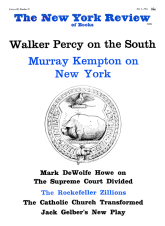In response to:
A Philosophical Poet from the June 3, 1965 issue
To the Editors:
In the provinces one doesn’t expect to be fully au courant, but it is nonetheless hard to feel much trembling anticipation when Mr. Mazzocco intimates [New York Review, June 3] that Robert Duncan’s poetry “curiously parallels” the concerns of Heidegger and Whitehead. One would have scarcely suspected such a curious parallel, nor does one see how it makes the poetry any more interesting. But everything comes clear when we are told that for Duncan “Poetry is…what we expected it to be when we were children.” And so, finishing the review, it is no surprise to hear this poetry described as “a breakthrough, a revelation…” that resembles Eckhart the medieval mystic. Surely no one could disagree with all this, yet is it possible to wonder if a fully critical judgment has been made even though “Duncan’s undulating images phantasmagorically surface”? The review’s title warns us that we are in the presence of “A Philosophical Poet,” but perhaps Mr. Duncan shouldn’t be held altogether responsible for the firm of Heidegger, Whitehead, childhood and revelation too.
William H. Pritchard
Amherst College
Amherst, Massachusetts
Robert Mazzocco replies:
Professor Pritchard isn’t kidding about living in the sticks. He needn’t worry, though, about not being “fully au courant.” He gurgles prettily enough. However, can he read? A. I did not categorize Duncan’s poetry as a breakthrough, a revelation…” Here is the full sentence: “Without wanting to put too fine a point on the matter, perhaps it is not to be wondered at that Duncan, as well as Heidegger and Whitehead, each in differing ways and to different degrees, each involved in a breakthrough, a revelation, should resemble Eckhart, the medieval mystic, author of the above quotation.” B. “Poetry is…what we expected it to be when we were children.” These are Duncan’s words, not mine, and they are viewed by me with a good deal less than indulgence. C. Just what is the professor’s point? A reviewer has nothing to do with any title placed above his article. Nevertheless, is the professor saying that childhood, revelation, and being “a philosophical poet” are incompatible? If so, how does he conduct his course on Wordsworth or Blake? Is the professor aware of Whitehead’s remarks concerning the Romantics, of Heidegger’s monograph on Hölderlin, of Process and Reality or Being and Time? Has he any notion of Duncan at all? “One would have scarcely suspected such a curious parallel…” What teasipping sham! If “the provinces” want to get in the game, I suggest they send someone in who knows how to bat.
This Issue
July 1, 1965



